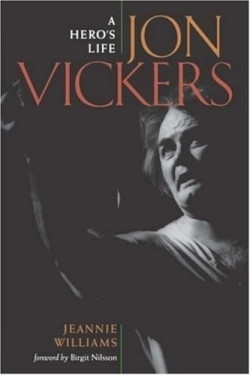It looks like you've stumbled upon a page meant to be read by our code instead of viewed directly. You're probably looking for this page.
Jon Vickers
A Hero's Life
Jon Vickers played the most demanding of operatic hero roles brilliantly. In a career spanning over thirty-five years, he was Aeneas, Otello, Parsifal, Tristan and Peter Grimes injecting into each role an emotional, intellectual and dramatic intensity. Vickers was known for his large voice, his deep religious beliefs and his often “difficult” bearing. He didn’t just sing a role, he became totally involved in the character he was portraying. Soprano Carol Vaness recounts this incident during a performance of Pagliacci with the Paris Opera—”(Vickers) is not a normal-type character in any way. He thinks very psychologically about the roles and relationship between characters. During one of the first performances (of the opera), he was supposed to drag me and kind of shove me, and I was supposed to fall. He practically threw me fifteen feet to the edge of the commedia platform. I landed flat on my back.”
It was not unusual for him to lecture the chorus, a fellow principal, the director or even a conductor about what the opera was about and why it must be performed in a certain way. Although this intensity often caused problems with fellow cast members and conductors sharing a performance with him, Vickers was unwavering in his approach to his art. As Birgit Nilsson, in her brief foreword to the book, states “he had to have it his way, no matter what.” Robert Merrill while describing how Vickers physically kicked him over during a performance of Carmen, explained this intensity as simply “Something happens to him onstage.”
Williams, a staff columnist for USA Today who has written about opera for a variety of periodicals, offers a well-researched, in-depth biography, beginning with Vickers’ birth in Prince Albert, Saskatchewan, his work on the family farm, employment with F. W. Woolworth, his decision to leave business and concentrate on singing and his early debuts with the Canadian Opera Company. The bulk of the book, though, concentrates on Vickers tenure at the Royal Opera House and his many appearances in opera houses around the world. Williams also includes a complete performance history, a selected discography, videography and bibliography.
The book is primarily composed of hundreds of interviews with those who knew and worked with Vickers, news articles about various performances, television and video performances and interviews, and the author’s own opera experiences, stitched together in a portrait of the artist. Her retelling of the story of Vickers’s life is detailed, interesting and well put together, but is missing a key element— direct input from Vickers himself.
Vickers, an intensely private man who believes that his art should speak for himself, did not cooperate with the creation of this book in any way. As a result, this biography, which is the first in-depth exploration of the artist available, comes off somewhat oblique, never convincing the reader who Vickers is, only telling the reader who others think he is.
Reviewed by
David Reid
Disclosure: This article is not an endorsement, but a review. The publisher of this book provided free copies of the book to have their book reviewed by a professional reviewer. No fee was paid by the publisher for this review. Foreword Reviews only recommends books that we love. Foreword Magazine, Inc. is disclosing this in accordance with the Federal Trade Commission’s 16 CFR, Part 255.
